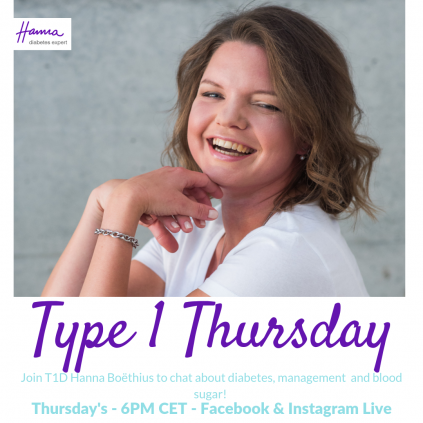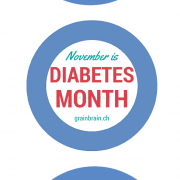Type 1 Thursday – Period & Blood Sugar?
Type 1 Thursday is back!
This one is for the ladies – managing blood sugar before and during your period, HOW?! 🥵
I was asked on Instagram about how I handle my blood sugar during my cycle, and I wanted to share my four best tips on what to do. It can certainly be tricky and requires extensive trial and error in order to find what works for you, but it’s definitely worth it.
Watch the recording of my Facebook live session here:
How do you manage? Share in a comment!
Transcription
If you prefer to read about period and blood sugars, here’s a transcribed version of the video above.
Welcome to the return of Type 1 Thursday! Type 1 Thursday has been enjoying a beautiful summer break. But we are now back and more than happy to share thoughts, concerns and everything else regarding Type 1 Diabetes, and blood sugar management, food, nutrition, all of these things that really bother us in our everyday life.
I am Hanna Boëthius, the founder of Hanna Diabetes Expert. I am also a Type 1 diabetic since 34 years, I was diagnosed in 1985. And I have a fantastic topic for you today! This one is for the ladies, so if any guys are watching, please, you’re welcome to stay. But it’s going to get a lot with female hormones and so on. If you’re interested, please tag along. If not, I completely understand if you choose to maybe not stay around for it this particular episode.
Today we are talking about how to control blood sugar, before your period during your period, as that can be really difficult especially when you do live with Type 1 Diabetes. It’s not just one hormone that is fluctuating at same time, and remember that you don’t even produce one of the key hormones. That’s why maybe don’t have as easy of a time as other ladies have.
Fluctuating hormones ahead of your period will, in most cases give you a very bumpy ride when it comes to your blood sugar. Our blood sugar is impacted by everything, not just insulin, movement and nutrition, those things that are commonly known as influencers of blood sugar. Beautiful hormones such as estrogen and progesterone definitely have a big impact on what happens to your blood sugar’s during, or ahead of that time of the month.
Estrogen and progesterone are the two biggest female hormones and are made in the ovaries, which is a really important thing for our bodies to do. It’s a natural thing that should be there and we shouldn’t suppress them, like some may suggest. They essentially prepare the uterus for the upcoming pregnancy, and if it doesn’t happen, that’s when you have your period. That is the whole point of those two hormones. So PMS or PMD, or whatever you want to call it, is all about the changes in hormone levels. That’s why you sometimes feel cranky, sometimes you want to cry about it, sometimes you are really hungry, and sometimes you crave weird foods that you didn’t have any clue that you were even eating anymore.
A lot of things can happen when your hormones are at play. This is also what causes the erratic blood sugars ahead of your period. Female hormones can also call cause insulin resistance, which is why we get fluctuating blood sugars. The body doesn’t react to the insulin like it should, because it’s impacted by the other hormones.
What can you do to make this better, to improve this for yourself? And what are the tips and tricks that maybe you can can do to to help your time of month get a little bit easier?
(I’m of course super happy to hear your experiences. Please share those with me in a comment somewhere on the internet, and I will continue the discussion with you there.)
Before I start the what’s and the how’s, remember that very often, in very many cases, insulin sensitivity returns on day one, or two of your period. Be careful and do not push too hard on the insulin dosing.
Number one of what you can do is to track. Track your cycle, when you have what symptoms and also track your blood sugar. There are beautiful apps for this! If you know of an app that combines period tracking or cycle tracking with your blood sugar, please let me know because I’m looking for one of those myself. What you do is to look at the trends from both of these trackings, and compare them and see where and when when you can expect to see the pattern of insulin resistance increasing. Then you know exactly on which day, at which point of time in your cycle, you have to start reacting. This can be done by on paper, as well. But I like to keep as much as I can digitalized, I would prefer to have an app to track both of these at the same time.
In terms of tracking, this is where a CGM really, really does pay off. You can see exactly when the blood sugar went up, and not have to wait for the finger prick to show you. CGM is the movie of your blood sugar, and the finger pricks are the photographs you take every once in a while. You simply get a more complete overall picture. I recommend every single Type 1 diabetic, who has the possibility, to get a CGM of some kind, so that you have a better overview of what’s going on in your body. We’re all individuals and all react differently.
Number 2, this goes hand in hand with the tracking – find out how insulin resistant you become so that you can change your insulin dosages in time. Or even before even the blood sugar starts going up. You can change your basal dose if that’s what’s needs tweaking and tracking during that time, or bolus, or maybe both need to be increased a little bit in the week or days before your period? Some women also experience a few days of insulin resistance when they ovulate in the middle of their cycle, but not everyone. And so that’s also a good reason for tracking, so that you can find out how much more insulin you need.
Number 3 is be ahead of the curve. Make sure that you do find the patterns through your tracking, so that you know what is happening when, to empower you to act before anything really happens at all. You have to go through how much you should increase your doses when you become insulin resistance ahead of your period with your healthcare professionals. Or if you feel comfortable doing it alone, then you know what, that’s fine. I suggest that you talk to health care professional, like your doctor, your CDE or nurse, who can help you figure this out and how to play with the dosages if you’re not comfortable doing it yourself.
Number 4, I know it’s difficult in many cases, but keep to your healthy lifestyle. Try to keep to your nutritious and nutrient dense foods that you’re eating, make sure that you move your body (that also helps the cramping), make sure that you de-stress because this is an additional stress on the body (which could also cause insulin resistance and your blood sugar’s to be wonky).Make sure that you have the supplements that you need, for example Magnesium can be really good for relieving cramps and also for de-stressing. Hydrate properly.
The reason why I chose this topic today is because I was asked on Instagram how I handle it in my own case. I have to say that I used to have huge problems with insulin resistance ahead of my cycle a couple years ago. My blood sugars would be up in the 200’s mg/dl, or 10-11 mmol/l, without me doing anything differently. I tried to handle it with these tips and tricks that I’ve just given you, I tried to work with insulin dosages, tried to work with all these tools that I have in my toolkit. Frankly, it was a hit and miss. I didn’t really know if I was going to be successful, if I increased the dose too early so that I would go low, for example. It was really difficult. But actually, and I know this sounds stupid, but the longer that I have stayed low carb and keto and not have eaten that much sugar, the more my hormones have, all together, regulated so that I don’t really have a problem today at all. Maybe it could be an age thing, as well. I’m older now, and I have a different body than I did a couple years ago. I really believe strongly that eating healthy, nutritious food can really help regulate your hormones, even the female hormones. Today I maybe notice a day ahead of my cycle that “oh something is off, I’m a little bit insulin resistant today”, followed by “oh yeah, of course”.
What are your experiences wit hormonal fluctuations and blood sugar? Leave a comment below and I’ll be happy to chat with you there.










Leave a Reply
Want to join the discussion?Feel free to contribute!